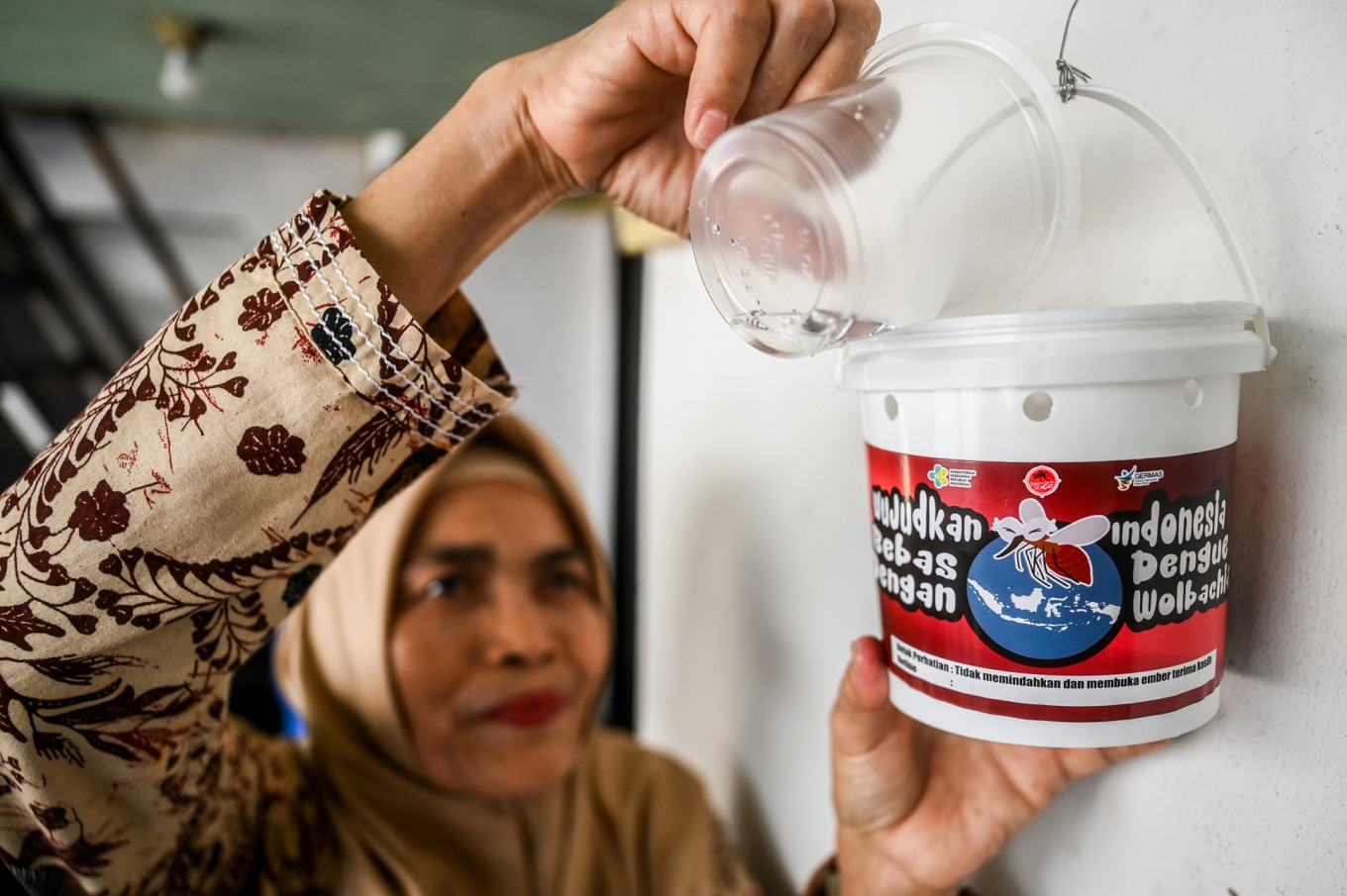Popular Reads
Top Results
Can't find what you're looking for?
View all search resultsPopular Reads
Top Results
Can't find what you're looking for?
View all search resultsWorry not of Wolbachia
There is little to no risk for the humans, pets and the environment from the spread of Wolbachia-infected mosquitoes or eggs.
Change text size
Gift Premium Articles
to Anyone
 A resident pours water on Oct. 4, 2024, into a bucket filled with Aedes aegypti mosquito larvae infected with the Wolbachia bacteria in Kembangan district, West Jakarta. The Jakarta administration is releasing the Wolbachia-infected mosquito eggs in an effort to control the spread of dengue in the city. (Antara/Rivan Awal Lingga)
A resident pours water on Oct. 4, 2024, into a bucket filled with Aedes aegypti mosquito larvae infected with the Wolbachia bacteria in Kembangan district, West Jakarta. The Jakarta administration is releasing the Wolbachia-infected mosquito eggs in an effort to control the spread of dengue in the city. (Antara/Rivan Awal Lingga)
W
olbachia has made headlines again recently, following the health authorities’ plan to step up their fight against dengue fever using mosquito eggs infected with the bacteria.
The Jakarta health agency kickstarted the pilot project on Friday, releasing 1,400 buckets of Wolbachia-infected mosquito eggs in Kembangan in West Jakarta, the district that had the highest incidence rate in the city last year.
Nearly 1,200 households volunteered to take care of the eggs until they hatch into adults that will spread the Wolbachia bacteria to other Aedes aegypti mosquitoes, dengue’s main vector, and potentially weaken the virus.
The release in West Jakarta, one of five regions selected for the Health Ministry’s pilot project for the Wolbachia approach to combat dengue, received a warm response in the country, where the viral disease is still endemic.
Health Ministry data found that as of the 33rd week of the year, dengue had infected more than 181,000 people, killing 1,079 of them. The incidence rate has exceeded last year’s cumulative figure of 114,720, which is why the new method comes at the right.
The method has reduced infection by up to 77 percent and the hospitalization rate by 86 percent, according to various studies and trials.
But the plan has also met obstacles as several parties have spread disinformation claiming that the technology can cause adverse effects on humans and the surrounding environment. The Wolbachia bacteria, they say, may make people and pets sick, or increase the mosquito population, leading to a surge in other mosquito-borne illnesses such as Zika, without adequate scientific evidence.
Concerns about these challenges are not without precedent. The Health Ministry canceled its plan to release Wolbachia-infected mosquito eggs in Denpasar and Buleleng in November of last year because of public resistance, which was fueled by disinformation.
In Jakarta, the Wolbachia approach faces the possibility of politicization, as one of the contenders for the governorship, Dharma Pongrekun, is known for his opposition to the technology.
When asked about the Jakarta government’s Wolbachia plan, he warned the public against the impact of the technology on humans. He insisted that it was human nature to kill or catch mosquitoes rather than spread the insects.
Critical views of a new technology are needed to help it develop and improve. Critical thinking itself is a sign indicative of advanced civilizations that have pushed for breakthroughs in many aspects of life.
In the Wolbachia case, the studies have discovered that the method is safe. There is little to no risk for humans, pets and the environment with the spread of Wolbachia-infected mosquitoes or eggs. No mutation of human DNA, no long-living heartworm in dogs or cats and no significant increase in mosquito populations that may bring other mosquito-borne illnesses have been found.
A trial in Yogyakarta in 2017 discovered the efficacy of the Wolbachia method. The success story was a result of strong relationships between the research team and local health authorities, government representatives and community leaders across the city. The trial was preceded by three months of social engagement, which was key to receiving public support for and minimizing resistance to the new method.
The Wolbachia method has gone through meticulous reviews by dozens of researchers, including a team of 25 scientists from various fields gathered by the Health Ministry. At this point, there should be no reason that we should be overly cautious about the Wolbachia plan.
The Wolbachia method is just one of many ways to beat dengue but offers us the best chance to achieve Indonesia’s goal to eliminate dengue deaths by 2030. We should listen to the best available science right now to prevent more people from getting sick or dying because of dengue.










